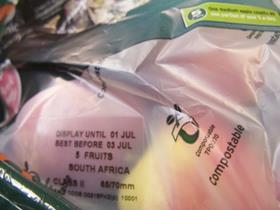
Wrap has called on retailers to make food labels less confusing for consumers in a bid to drive down food waste.
In aretail survey reportpublished on 5 November the food waste organisation revealed how 60 UK supermarkets manage food waste across the 2,000 most commonly wasted food items.
For the first time, each retailer has received a detailed assessment of its own performance, including where improvements are required, which is summarised in theretail survey.
Progress in date labels
The research found that a quarter of all pre-packed unprepared fresh produce now carries no date label, while the available shelf life of other products, such as milk, has increased.
The amount ofproduct lifeavailable to consumers has remained stable on many products. However, more than one-fifth of items found on shelf had just two days or fewer remaining life, including bread, minced beef and berries.
Meanwhile, a quarter of all pre-packed unpreparedfresh producenow carries no date label, which aligns to the updated guidance. Three retailers have removedBest Before on some fresh produce, with another committing to remove them from selected produce.
Almost all products had correct homestorage adviceand Wrap’sLittle Blue Fridgelogohas increased in prominence. This indicates when foods, such as apples, stay fresher for longer when refrigerated at home.
Eight retailers are committed to reviewing or amendingstorage temperature adviceof “<5oC” to products. This helps prompt people to check the temperature of their fridge in a bid to keep food safe and fresher for longer.
Room for improvement
Despite these encouraging developments, little evidence was found of retailers having implemented guidance to removeopen lifestatements except where food safety is an issue.
Bagged saladstypically have very conservative guidelines on Open Life of just one day and more could potentially extend this.
Meanwhile, more than 70 per cent offresh potatoescarry aBest Beforelabel and the average available product life has decreased by around one day (to four days). More than 10 percent of 2.5kg bagged white potato, when surveyed, had less than two days available product life.
Wrap praised the increased availability of smaller packs, for example on dairy and meat items, but pointed out that they were significantly more expensive per kg than larger weights.
In addition, the organisation wants the phrase ‘Freeze on Day of Purchase’stopped. This can lead people to throw away good food, instead of freezing it up until the date mark.
Three retailers have completely removed the phrase from packaging and eight more are removing the remaining few products that carry the statement.
Wrap director Peter Maddox said: “The way food and drink is packaged, labelled and priced can influence household food waste, and retailers and brands are uniquely placed to help minimise food waste in the home.
“Our research shows that people want clear, consistent information on pack to help them keep food fresher for longer. Overall, we’ve seen good progress from all, but we have also been very clear with each company where more work is required, and where they are falling short.”
New fresh produce guidance
The results are accompanied by new guidance for the sector forfresh, uncut fruit and vegetables, produced by Wrap, the Food Standards Agency and Defra.
The guidance will help retailers identify where more fresh produce can be sold loose and reduce the application of Best Before dates on some pre-packed fresh produce where it can help reduce food waste at home.
In addition, Wrap has updated its guidance on applying date labels and packaging choices for fresh produce, the most wasted food category in the home.
Having a range of pack-sizes and formats including loose can help to reduce food waste, the charity said. Offering fresh produce loose gives customers the opportunity to purchase the correct amount for their needs.
Where fresh produce is packaged, the absence of a Best Before date, on some items, can also help to reduce waste by encouraging people to use their judgement more.However, Maddox stressed that the removal of packaging “must be done carefully to avoid food waste”.
Loose trial at Morrisons
Wrap has also developed decision-making tools and guidance for retailers to encourage both actions, and published a case study on a fresh produce trial undertaken at aMorrisonsstore in North Yorkshire.
The trial involved increasing the number of fresh produce lines sold loose and found that people shopped more often, for smaller quantities of fresh produce, which could be particularly beneficial for high-waste produce such as potatoes.
An evaluation of the trial found most people preferred buying fresh produce loose, because they could choose the size and condition, buy the exact quantity required and because it didn't have plastic packaging. A small group of customers preferred plastic packaging for convenience and hygiene reasons.
Following the successful 10-month trial, Morrisons plans to roll out the initiative to 60 stores by the end of 2019.
Research also shows that the presence of adate label, of any type, influences behaviour and makes people more likely to discard food once the date has passed.
While there is no legal requirement for fresh, uncut fruit and vegetables to have a date label, using a Best Before date on some short-life products with limited time for consumption in the home can help to prevent fresh produce waste.
However, WRAP recommends removing Best Before dates from fresh produce, where appropriate, and encouraging people to judge when to eat fresh produce.






No comments yet